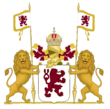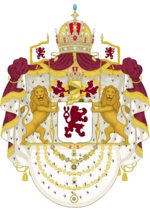Government of Werania
| Government of Werania | |
|---|---|
 Logo of the Weranic government | |
| Overview | |
| Established | 1842 (inaugural) 1993 (current constitution) |
| State | Weranian Confederation |
| Leader | Premier |
| Appointed by | Federal Presidency |
| Main organ | Cabinet |
| Responsible to | Bundestag Herrstag • Volkstag |
| Headquarters | Obermenstraße, Westbrücken |
 |
|---|
| This article is part of a series on the politics and government of Werania |
|
|
The Weranian Federal Government (Weranian: Ostischer Bundesregierung) exercises executive authority over Werania. It consists of the Premier and a cabinet of 16 ministries, known as Federal Ministers (bundesminister). Junior ministers are not part of the wider Cabinet. Members of the Cabinet are collectively responsible to the Bundestag and can be removed through a vote of no confidence in the Volkstag. The Premier officially appoints and can dismiss members of the cabinet.
The current Cabinet was inaugurated on the 28 June 2019 following the assumption to the premiership of Otto von Hößlin. 14 members are from the National Consolidation Party whilst 2 members are from the Democratic Alternative. Four individuals who are not members attend cabinet meetings, with one being from the NKP, one from the DA and two not affiliated with a political party.
History
Appointment
Cabinet ministers in Werania are appointed by the Premier. All members of the Cabinet must sit in either of the two chambers in the Bundestag. Since 1993, dual mandates of non-parliamentary positions have been illegal for cabinet members. Cabinet members must themselves be civilians who are full citizens of Werania, over the age of 25 and have not committed a felony.
Members of the cabinet enjoy immunity from legal prosecutions unless the Premier and Attorney General agree to open investigations against members. Cabinet members are obliged to resign en masse if the cabinet loses a vote of no confidence and at the end of a parliament's term. During the period in which a cabinet has resigned but a new one has not yet been formed the cabinet becomes a demissionary cabinet which only retains emergency powers.
The cabinet is divided into two positions - members who head ministries and vote within internal cabinet meetings and those who are not officially members who are appointed by the Premier to attend cabinet meetings but neither head a ministry nor are able to vote on policy matters. Junior ministers known as ministers of state (staatsminister) are also appointed within ministries to handle more specialised portfolios, but are not considered part of the cabinet requiring the premier's permission to attend cabinet meetings and doing so as non-voting members.
Formation
The formation of the cabinet is constitutionally a complex affair. Following an election wherein no party gets a majority the monarch is tasked to appoint an informateur who seeks potential coalition configurations by consulting between parties before reporting to the monarch to appoint a regierungsbildner (usually the leader of the largest party of a potential coalition) to form a government. The regierungsbildner is considered to be the prospective premier.
The cabinet is elected alongside the premier by the Volkstag by a simple majority ballot. Once the cabinet is approved by a majority of legislative deputies the monarch then formally approves of the candidacy - if the Monarch rejects the nomination from the legislature the Monarch and Bundestag are given a week to come to a consensus - ultimately however if no consensus is reached the Volkstag's nomination automatically becomes a member of the cabinet.
Government mandate
Structure
Defunct positions
Current composition
Official cabinet members
| Position | Member | Member since | Seat | Political party | |
|---|---|---|---|---|---|
| Federal Premier Bundesministerpräsident |
 Otto von Hößlin |
28 June 2019 | House of Deputies | NKP | |
| Federal Vice-Premier Bundesvizeministerpräsident Minister of Foreign Affairs and Euclean Relations Minister für Auswärtige Angelegenheiten und Eucläische Beziehungen |
 Käthe Schickdanze |
28 June 2019 | House of Deputies | DA | |
| Minister of the Interior and Community Minister für Inneres und Heimat |
 Jörg Bullmann |
28 June 2019 | House of Deputies | NKP | |
| Minister of Finance Minister für Finanzen |
 Wolfgang Kanther |
28 June 2019 | House of Deputies | NKP | |
| Minister of Economy and Industry Minister für Wirtschaft und Industrie Minister for State Enterprises and Privatization Minister für staatliche unternehmen und privatisierung |
 Alexander Oberländer |
28 June 2019 | House of Councillors | NKP | |
| Minister of Defence Minister für Verteidigung |
 Anton Raicevich |
3 August 2021 | House of Deputies | NKP | |
| Minister of Justice Minister für Justiz Minister for Women and Social Mobility Ministerin für Frauen und Soziale Mobilität |
 Andrea Däubler |
28 June 2019 | House of Deputies | NKP | |
| Minister of Social Affairs and Employment Minister für Soziales und Beschäftigung |
 Rolf Pfefferberg |
28 April 2022 | House of Deputies | DA | |
| Minister of Health Services Minister für Gesundheitsdienste |
 Sabrine Dümmler |
28 June 2019 | House of Deputies | NKP | |
| Minister of Education, Youth and Science Minister für Bildung, Jugend und Wissenschaft |
 Egon Niebergall |
28 June 2019 | House of Deputies | NKP | |
| Minister of Transport and Infrastructure Minister für Verkehr und Infrastruktur |
 Beatrix Schockenhoff |
28 June 2019 | House of Councillors | NKP | |
| Minister of Regional Government and Development Minister für Regionalregierung und Entwicklung Minister of Digital Innovation Minister für digitale innovation |
 Melanie Bätzing-Lichtenthäler |
28 June 2019 | House of Deputies | NKP | |
| Minister of Agriculture, Forests and Fisheries Minister für Landwirtschaft, Forsten und Fischerei |
 Wilhelm Stahlman |
28 June 2019 | House of Councillors | NKP | |
| Minister of Energy and the Environment Minister für Energie und Umwelt |
 Martin Stammberger |
28 June 2019 | House of Deputies | NKP | |
| Minister of Culture, Tourism and Sports Minister für Kultur, Tourismus und Sport |
 Girenas Bujanauskas |
28 June 2019 | House of Deputies | NKP | |
| Minister of Administrative and Constitutional Reform Minister für Verwaltungs und Verfassungsreform |
 Andreas Scheel |
28 June 2019 | House of Councillors | NKP |
Also attending
| Position | Member | Member since | Seat | Political party | |
|---|---|---|---|---|---|
| Herrstag Legislative Coordinator Herrstag Legislativkoordinator |
 Norbert Böhmer |
28 June 2019 | House of Councillors | NKP | |
| Junior Legislative Coordinator Junior Legislativkoordinator |
 Eckart Krichbaum |
28 June 2019 | House of Deputies | NKP | |
| Attorney General Generalstaatsanwalt |
 Volker Bottenbruch |
20 August 2012 | N/A | Independent | |
| Federal Chancellor Bundeskanzlerin |
 Isabella Leitgeb |
15 July 2011 | N/A | Modern Centre (Membership suspended) |
